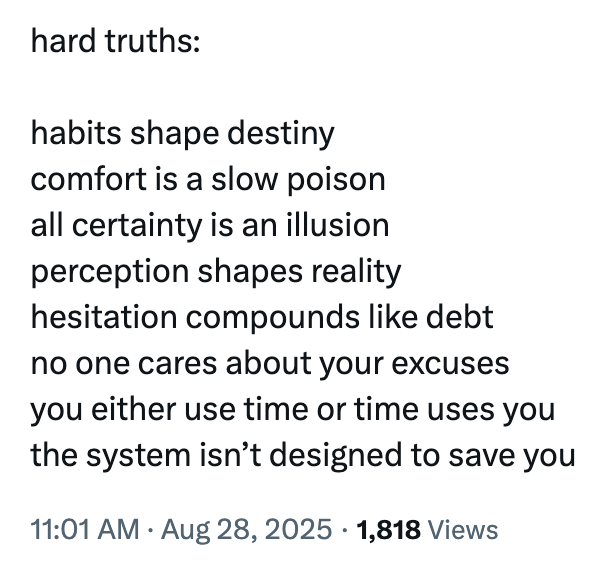8 hard truths about personal agency that will ruin your comfort zone
spoiler: no one is coming to save you
I posted this on 𝕏 as a random brain dump while I was procrastinating on real work earlier (I like to think of it as “productive procrastination” where you tweet profound-sounding thoughts instead of tackling the thing you actually need to do.) But now I can't stop thinking about it, so I figured I’d expand over here. It’s a list of “hard truths” that point toward something I've been trying to articulate about personal agency and the gap between how we think the world works and how it actually operates beneath the surface.
I’d be curious to know what you think I missed, or what you’d add to the list:
habits shape destiny—
Aristotle said we are what we repeatedly do, but he made it sound noble, like excellence was some grand achievement we consciously pursued. The reality feels messier and more unsettling than that. We become the sum of our smallest, most forgettable choices. The way we handle phone notifications, how we respond when someone disagrees with us, what we do in those twenty minutes after we say we're going to start working.
Think about the person who talks endlessly about the novel they're going to write but hasn't opened a document in months. Their destiny isn't being shaped by their dreams or intentions; it's being carved out by Netflix algorithms and the dopamine hit of doomscrolling. The habit of avoidance becomes more powerful than any conscious goal and it quietly writes a story they never intended to live.
We like to imagine our futures being built by dramatic moments of decision, but they're actually being constructed in the mundane repetition of Tuesday afternoons and Sunday mornings, when no one is watching and nothing feels particularly important.
comfort is a slow poison—
Seneca understood this intimately. He wrote about how luxury makes us soft and how ease makes us forget what we're capable of. Granted he was writing from exile, so maybe he had clarity the rest of us lack, but still.
Either way, this isn't about rejecting all pleasure or living like some kind of monk. It's about recognizing that comfort, when it becomes your default state, erodes your capacity for growth in ways you don't notice until it's too late. We've all watched brilliant people take comfortable jobs that ask nothing of them, and over time—almost imperceptibly—they start to forget they were ever brilliant at all.
The poison isn't the comfort itself; it's the way comfort makes you forget that muscles atrophy without resistance, that skills fade without challenge, or that the edge you once had was sharper because it was met with something hard. We mistake ease for success, but ease is often just the slow dissolution of whatever made us capable in the first place.
all certainty is an illusion—
Bertrand Russell said the stupid are cocksure while the intelligent are full of doubt, and I think he was pointing to something more dangerous than intellectual arrogance. Certainty functions as a psychological defense mechanism. We mistake our models of reality for reality itself because the alternative, admitting we don't really know what's going on, feels unbearable for our ego.
But I think the people who cause the most damage aren't usually evil. They're just certain. We've all seen this play out: markets crash because too many people become certain about trends that seemed obvious in retrospect. Relationships end because we become certain about what the other person is thinking, feeling, intending, without ever checking if our certainty matches their reality.
There's a kind of blindness that comes with certainty, a narrowing of vision that makes us miss the very signals that might save us. The most dangerous phrase in any language might be "I know exactly what's happening here."
perception shapes reality—
William James wrote that experience is what we agree to attend to, which sounds academic until you realize how radical the implications are. Two people can live through identical events and construct entirely different realities based purely on what they choose to notice, remember, or emphasize.
We all know someone who sees themselves as fundamentally unlucky—every small misfortune confirms the narrative while every stroke of good fortune gets dismissed as coincidence or explained away. Over time, this selective attention creates a feedback loop that's almost mystical in its power. They make decisions from their "unlucky" identity, which creates outcomes that match the perception, which proves they were right all along.
But the reverse is equally true and equally powerful. The person who notices opportunities, who frames setbacks as data rather than verdicts, who pays attention to what's working rather than what's broken, seems to live in a completely different universe—one where possibilities multiply rather than contract.
hesitation compounds like debt—
This might be the cruelest truth on the list because it's so mathematically precise in its operation. Each moment of hesitation makes the next moment of hesitation easier, more natural, more justified. The startup idea you don't pursue makes it simpler to not pursue the next one. The difficult conversation you avoid makes it easier to avoid all difficult conversations.
It works exactly like compound interest, but in reverse because hesitation builds on itself until taking action requires exponentially more energy than it would have originally required. We've all felt this. That idea that seemed so clear and actionable six months ago now feels impossible, not because anything external changed, but because hesitation created its own gravitational field.
Marcus Aurelius wrote about how much trouble we avoid by not overthinking what others are doing, but I'd add: how much trouble we create by overthinking what we should be doing instead of simply beginning.
no one cares about your excuses—
This sounds harsh until you realize it's wrapped in a deeper kindness that most of us never receive. David Foster Wallace said you become less concerned with what others think when you realize how seldom they actually think about you at all. Your elaborate explanations for why things didn't work out, your careful justifications for choices that didn't pan out—they exist mostly for your own psychological benefit.
The world doesn't care about your excuses not because it's heartless, but because everyone else is busy constructing their own explanations for their own disappointments. We're all so absorbed in our own internal narratives that we barely have bandwidth for anyone else's story, let alone their reasons for why the story went wrong.
Once you accept this—really accept it—something shifts. You can stop crafting perfect justifications and start crafting better outcomes. The energy that went into explanation can redirect toward action.
you either use time or time uses you—
Franklin's "time is money" misses something essential. Money is renewable; time operates by different rules entirely. Oliver Wendell Holmes got closer when he observed that many people die with their music still in them—that haunting sense of potential energy that never found its expression.
Using time means making conscious choices about attention and energy, treating each hour as a canvas rather than a container to be filled with whatever demands the loudest attention. Time uses you when you drift, when you default to whatever requires the least immediate effort, when you mistake busyness for purposefulness.
We've all had those days, weeks, months that disappear into algorithmic feeds designed not to inform or inspire but simply to capture attention, to keep us scrolling, clicking, consuming. Time used us and we hardly noticed until suddenly we're wondering where the year went.
the system isn’t designed to save you—
This isn't a conspiracy theory or an indictment of capitalism, it's just how systems work at their most fundamental level. They optimize for system survival and efficiency, not individual flourishing. The economic system isn't designed to make you wealthy; it's designed to allocate resources efficiently and generate wealth collectively. The education system isn't designed to make you wise; it's designed to produce functional workers and citizens who can operate within existing structures.
Understanding this isn't demoralizing, it's clarifying in a way that feels almost liberating. Once you accept that no external system is optimized for your personal success, you can stop waiting for rescue and start building your own approach to whatever it is you're trying to accomplish.
Systems will use you efficiently if you let them, but they won't necessarily use you in ways that serve your deepest intentions or highest capabilities. That's not their job. That's yours.
Everything on my list points toward agency. Not the kind of agency we pretend to have—the grand illusion of control over outcomes—but the quieter, more difficult agency of conscious choice in each moment.
The truth is, most of us are living reactively, responding to whatever demands the most immediate attention, mistaking reaction for action, busyness for purpose, explanation for understanding. As such, the most valuable thing we can cultivate isn't intelligence or talent or connections—it's agency. The ability to act consciously rather than reactively. To make choices based on where we want to go rather than where we've been pushed by forces we barely recognize.
These truths hurt because they're diagnostic. They force uncomfortable questions about whether you're actively shaping your life or just responding to it with increasing sophistication. But that discomfort is precisely what makes them useful because you can't exercise agency over patterns you refuse to see clearly.
So, what do we actually do with this awareness once we have it?
I've been working on something I call THE DAILY 5 with my paid readers—a journaling practice designed specifically for this kind of awareness and pattern recognition. It's built around paying attention to the feedback loops in our own lives: the small cycles that compound into larger realities and the moments where we have actual choice points if we're conscious enough to see them. Because awareness without a practice to act on that awareness is just another form of self-torture.
The 5-minute daily ritual that changed how I think
·THE DAILY 5 is a weekly journaling practice for people who want to understand themselves better—but don’t have hours to reflect every day. It’s structured, intentional, and grounded in real self-awar…
These eight truths aren't meant to make you feel bad about your life, they're meant to help you see the levers you actually have access to and highlight the places where small adjustments in attention and action can create disproportionate change over time. The goal isn't to control outcomes. It's to become the kind of person who makes conscious choices about the patterns they're creating, who pays attention to what they're building with their attention, and who understands that in a world of systems optimized for their own purposes, the most radical act might just be the decision to live deliberately.
That's what agency actually looks like. It’s not the power to control what happens to you, but the power to choose your response to what happens. And that choice, made consciously and repeatedly, is how you shape everything else.
These eight truths feel important to me, but of course they're filtered through my own obsessions and blind spots, so I might be missing something obvious. What would you add to this list?
XO, STEPF
MORE TO EXPLORE 🐆
the weight we didn't know we could carry
There’s something strangely mathematical about how loss compounds. Not the clean arithmetic we learn in classrooms, but the strange algebra of human endurance, where each subtraction somehow multipli…
the alchemy of a worldview
There's a somewhat startling moment in intellectual development when you realize that most of what you believe isn't actually yours. The political positions, moral frameworks, aesthetic preferences, …
nobody actually knows what they're doing
Before we get into it: nobody actually knows what they’re doing, but the people who figure it out faster are usually the ones paying attention to their own patterns and the patterns that rule the systems around them.


















cannot get over how well-designed your essays are. all lower case titles, em dash at the end, squiggly dividers. This is peak aesthetic.
don’t hide behind proxy’s, face uncertainty head on